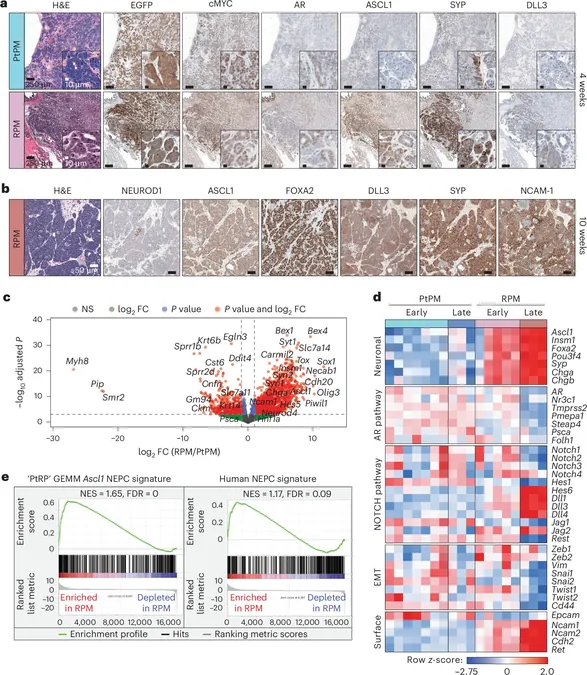
Shocking Discovery Unveils ASCL1's Critical Role in Treatment-Resistant Neuroendocrine Prostate Cancer
2024-10-28
Author: Arjun
Introduction
Breakthrough findings from cancer research are unveiling critical insights into a dangerous and aggressive form of prostate cancer known as neuroendocrine prostate cancer (NEPC). This variant, which poses a significant challenge to existing treatments, has been linked to the protein ASCL1—a discovery that could pave the way for new therapeutic strategies.
Background on Prostate Cancer Treatment
Most prostate cancers are categorized as adenocarcinomas, which primarily depend on the androgen receptor (AR) for growth and survival. Over the last decade, several successful AR-targeting drugs have emerged, thanks in large part to the pioneering work of Dr. Charles Sawyers from the Memorial Sloan Kettering Cancer Center (MSK). These treatments have saved countless lives, yet a concerning number of patients develop resistance to them.
Lineage Plasticity in Prostate Cancer
Recent research led by Dr. Sawyers and his team has uncovered a startling mechanism: prostate cancer cells can completely alter their identity to evade the effects of AR-targeting medications. This phenomenon, known as lineage plasticity, allows adenocarcinoma cells to transform into NEPC, a form of the disease that is not only more aggressive but also poses a higher mortality risk for patients. Alarmingly, NEPC arises in about 15% of patients undergoing AR therapy, drastically reducing median survival rates to just 18 months.
Innovative Research Platform
In response to this urgent challenge, Dr. Sawyers and his colleagues have engineered an innovative research platform designed to observe the early stages of this cellular transformation. This new tool will enable scientists to dissect the genetic mutations and cellular interactions that drive the shift from adenocarcinoma to NEPC, shedding light on how the surrounding tumor microenvironment influences this dangerous change.
Role of ASCL1
One of their most pivotal findings has been the role of ASCL1 in facilitating the transition to NEPC. Interestingly, disabling the ASCL1 gene can effectively prevent this transformation, but timing is crucial. If the deletion occurs before the cancer has transitioned, it inhibits the progression, but if NEPC is already established, removing ASCL1 may only temporarily reduce tumor size, allowing the cancer to eventually return, potentially in an even more aggressive form.
Publication and Future Directions
The study detailing these findings has been published in *Nature Cancer*. Dr. Rodrigo Romero, a research fellow involved in the study, emphasizes the potential of ASCL1 as a promising drug target. However, he warns that early intervention is critical for patients at risk of progressing to NEPC.
Organoid Technology in Cancer Research
What has dramatically expedited this research is their newly developed platform that utilizes organoids—miniaturized, simplified versions of organs—enabling scientists to conduct genetic modifications much faster than traditional mouse models. Previous methodologies could take years, but with organoids and CRISPR technology, researchers can quickly manipulate and analyze gene functions, providing immediate insights into the dynamics of prostate cancer progression.
Potential for Targeted Therapies
While current treatment options do not focus on ASCL1, insights gained from this research could lead to the development of targeted therapies. Scientists are optimistic about the potential to create effective small-molecule drugs against ASCL1, following the success of targeting previously "undruggable" proteins like KRAS.
Long-Term Research Goals
The long-term aim of this research is to compile a detailed understanding of additional genes and their interactions in the development of NEPC. This could facilitate the identification of biomarkers that predict which patients with adenocarcinoma are at the highest risk for transitioning to NEPC, allowing for more tailored treatment approaches.
Conclusion
As this cutting-edge research continues, it holds the promise of transforming the landscape of prostate cancer treatment and improving patient outcomes for those battling this formidable disease. Now, more than ever, the medical community is hopeful that breakthroughs like these could not only save lives but also revolutionize how patients are treated based on their specific cancer profile.




 Brasil (PT)
Brasil (PT)
 Canada (EN)
Canada (EN)
 Chile (ES)
Chile (ES)
 España (ES)
España (ES)
 France (FR)
France (FR)
 Hong Kong (EN)
Hong Kong (EN)
 Italia (IT)
Italia (IT)
 日本 (JA)
日本 (JA)
 Magyarország (HU)
Magyarország (HU)
 Norge (NO)
Norge (NO)
 Polska (PL)
Polska (PL)
 Schweiz (DE)
Schweiz (DE)
 Singapore (EN)
Singapore (EN)
 Sverige (SV)
Sverige (SV)
 Suomi (FI)
Suomi (FI)
 Türkiye (TR)
Türkiye (TR)